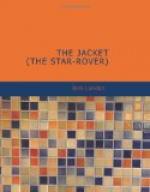No; I am not to be hanged for his murder. I received a life-sentence for my punishment. I was thirty-six years of age at the time. I am now forty-four years old. I have spent the eight intervening years in the California State Prison of San Quentin. Five of these years I spent in the dark. Solitary confinement, they call it. Men who endure it, call it living death. But through these five years of death-in-life I managed to attain freedom such as few men have ever known. Closest-confined of prisoners, not only did I range the world, but I ranged time. They who immured me for petty years gave to me, all unwittingly, the largess of centuries. Truly, thanks to Ed Morrell, I have had five years of star-roving. But Ed Morrell is another story. I shall tell you about him a little later. I have so much to tell I scarce know how to begin.
Well, a beginning. I was born on a quarter-section in Minnesota. My mother was the daughter of an immigrant Swede. Her name was Hilda Tonnesson. My father was Chauncey Standing, of old American stock. He traced back to Alfred Standing, an indentured servant, or slave if you please, who was transported from England to the Virginia plantations in the days that were even old when the youthful Washington went a-surveying in the Pennsylvania wilderness.
A son of Alfred Standing fought in the War of the Revolution; a grandson, in the War of 1812. There have been no wars since in which the Standings have not been represented. I, the last of the Standings, dying soon without issue, fought as a common soldier in the Philippines, in our latest war, and to do so I resigned, in the full early ripeness of career, my professorship in the University of Nebraska. Good heavens, when I so resigned I was headed for the Deanship of the College of Agriculture in that university—I, the star-rover, the red-blooded adventurer, the vagabondish Cain of the centuries, the militant priest of remotest times, the moon-dreaming poet of ages forgotten and to-day unrecorded in man’s history of man!
And here I am, my hands dyed red in Murderers’ Row, in the State Prison of Folsom, awaiting the day decreed by the machinery of state when the servants of the state will lead me away into what they fondly believe is the dark—the dark they fear; the dark that gives them fearsome and superstitious fancies; the dark that drives them, drivelling and yammering, to the altars of their fear-created, anthropomorphic gods.
No; I shall never be Dean of any college of agriculture. And yet I knew agriculture. It was my profession. I was born to it, reared to it, trained to it; and I was a master of it. It was my genius. I can pick the high-percentage butter-fat cow with my eye and let the Babcock Tester prove the wisdom of my eye. I can look, not at land, but at landscape, and pronounce the virtues and the shortcomings of the soil. Litmus paper is not necessary when I determine




